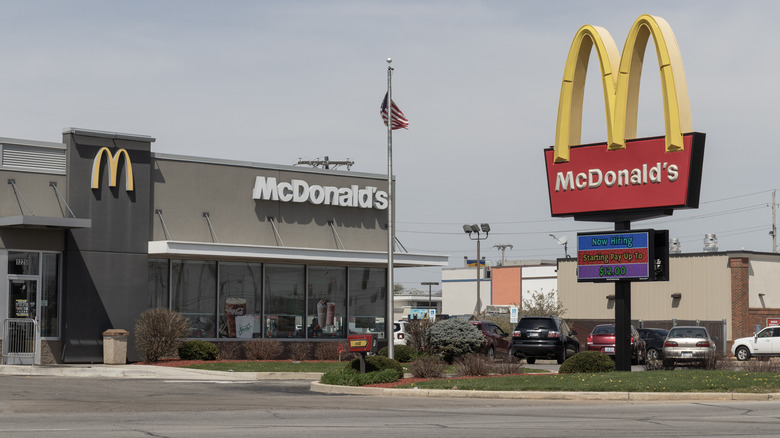Is It Possible To Get Your Eggs Served A Little Runny At McDonald's?
While customer satisfaction is no doubt important to McDonald's, the iconic fast-food chain stops short of meeting customer demands in one key area. In the event you like your egg yolks to be a little bit runny when enjoying a breakfast sandwich, the chain will not be willing to meet your request. According to Chef Mike Haracz, McDonald's former Manager of Culinary Innovation who spoke out on TikTok, the chain insists on fully cooking eggs to reduce the chance of foodborne illness.
Over-easy eggs feature a yolk that's not completely cooked, which the USDA confirms poses a risk for salmonella. While steps are taken at egg processing plants to reduce this risk, it's still possible for salmonella to be inside the egg — even when the shell is completely intact. The best way to offset this risk is to ensure the egg is cooked through and that the yolk is firm.
McDonald's takes food safety very seriously
According to Chef Haracz, McDonald's provides a substantial number of eggs to American customers each year (the restaurant claims to serve over two billion eggs annually in the U.S. alone). Based on these figures, the chances of someone falling ill after consuming a runny egg are not inconsequential. As a result, the chain insists on cooking its fresh round eggs completely through when making breakfast sandwiches (the folded eggs available at the chain are actually derived from a liquid mixture and cooked prior to being used in the restaurant).
Watch on TikTok
Haracz also mentions "food safety protocols" and training of staff members, which he posits can't be guaranteed from location to location. The restaurant has multiple protocols in place, such as third-party assessments of food suppliers, health inspections of its locations, and the implementation of a risk management dashboard. But while these steps are effective at reducing the risk of foodborne illness, they're not completely foolproof.
McDonald's has experienced issues with foodborne illness in the past
As reported by ABC News, an egg supplier that collaborated with McDonald's was the subject of FDA scrutiny in 2011. Sparboe Farms received multiple violations for its practices while producing eggs, practices that greatly increased the risk of salmonella in its products. At that point, the manufacturer provided eggs for a multitude of McDonald's locations, as well as Target stores. As a result, McDonald's cut ties with the egg manufacturer.
While eggs weren't cited as the underlying cause, Insider reported on a food poisoning outbreak that occurred at a Jamestown, New York McDonald's location in 2018. The cause of the illness was believed to be the chain's breakfast sandwiches, which triggered symptoms like stomach upset and vomiting in 22 people. To avoid further issues, the location at the heart of the outbreak was closed and sanitized. Potentially contaminated items were also tested to determine the underlying cause of illness. No restaurant can completely avoid issues with foodborne illness, but imposing standards regarding cooking methods can help safeguard customers.


